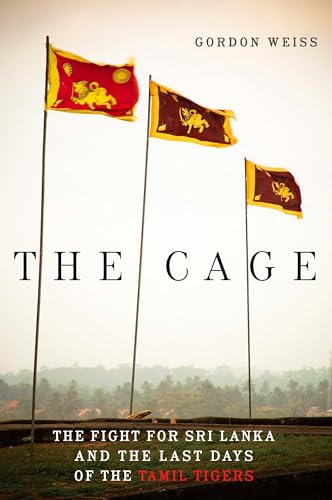The Cage
The Fight for Sri Lanka and the Last Days of the Tamil Tigers
Gordon Weiss
BOOK REVIEW

In the tapestry of modern history, few conflicts resonate with such heart-wrenching intensity and political complexity as the decades-long struggle in Sri Lanka. The Cage: The Fight for Sri Lanka and the Last Days of the Tamil Tigers by Gordon Weiss unravels this tragic saga with piercing clarity and a visceral urgency that grips at the very core of human empathy. Through Weiss's lens, we dive headfirst into a world teetering on the brink of despair, where the echoes of war mingled with the aspirations of a divided people.
What sets The Cage apart is Weiss's role not just as an observer but as a participant in the tumultuous events he chronicles. His tenure with the United Nations in Sri Lanka during the final days of the civil war provided him with a unique vantage point-one that he translates into a narrative as haunting as it is enlightening. The pages pulsate with the stories of those caught in the crossfire, their lives intertwined with the shifting tides of power and ideology that defined the Tamil struggle for autonomy.
This book is not merely an account of battles and geopolitical strategies; it is a profound meditation on human resilience and suffering. The imagery Weiss conjures is both stark and poetic-a vivid portrayal of the devastation wrought upon the Sri Lankan landscape and its people. The visceral descriptions of the war's aftermath evoke potent emotions, forcing readers to confront the stark realities of conflict that many would prefer to ignore. As you turn each page, you're not just reading history-you are experiencing it, feeling the weight of loss and yearning for justice.
Weiss's incisive analysis of the Tamil Tigers, both as a military force and a symbol of a community's desperation, is both compelling and challenging. He confronts the complexities of their fight-not romanticizing their actions but instead offering a nuanced exploration of their motivations and the societal conditions that birthed such radicalism. In a world quick to label and dismiss, Weiss's narrative calls for a deeper understanding of the human psyche's darker corners, compelling us to question not just the actions of the Tigers but the systemic failures that led to their rise.
Readers have been both captivated and polarized by this work. Some laud Weiss as a courageous voice, illuminating truths that the global community has often overlooked. Others criticize him for what they deem a lack of objectivity, suggesting that his emotional investment clouds his analysis. This tension is indicative of the broader discourse surrounding the Sri Lankan conflict-a reflection of the deeply entrenched views that continue to divide its people. Yet, this is precisely what makes The Cage so vital. It invites robust debate and reflection, pushing readers to grapple with their perspectives on justice, accountability, and the human condition.
Set against the backdrop of the post-9/11 world, The Cage resonates further as it explores post-colonial identity and the often fraught quest for self-determination. The reverberations of the Sri Lankan civil war echo in the conversations surrounding other global conflicts-reminding us that the struggle for dignity and autonomy knows no borders and is a reality for countless communities worldwide. Through Weiss's meticulous documentation, we are compelled to confront the spools of history that tie us together in our shared humanity, challenging the reader to reconsider the narratives they consume.
No exploration of The Cage would be complete without acknowledging the emotional toll it can take on its readers. In its depths, one finds not only sorrow but also stirring calls for solidarity-inviting us to empathize with the plight of those who suffer far beyond the comfort of our own lives. It urges you to recognize the pulse of human experience in the lifeblood of a struggling nation, highlighting their undying hope even amid despair.
In today's world, where headlines of conflict bombard us daily, The Cage serves as a clarion call to vigilance, compassion, and understanding. It is a reminder that those affected by war and trauma are not merely statistics-they are vibrant, complex individuals fighting for a voice in a world that often silences them. By engaging with Weiss's powerful narrative, you not only witness history but are also challenged to act, to feel, and to engage with stories that, unlike the pages of this book, do not conclude neatly.
In essence, The Cage transcends its immediate subject matter to serve as a mirror reflecting the complexities of conflict, identity, and humanity itself. While the information it holds may leave you shaken, it is precisely this unease that propels you to reflect and, ultimately, to empathize. 💔 Because in the end, understanding is the first step towards healing-and perhaps, a step towards a brighter tomorrow for those still fighting their cages.
📖 The Cage: The Fight for Sri Lanka and the Last Days of the Tamil Tigers
✍ by Gordon Weiss
🧾 376 pages
2012
#cage #fight #lanka #last #days #tamil #tigers #gordon #weiss #GordonWeiss